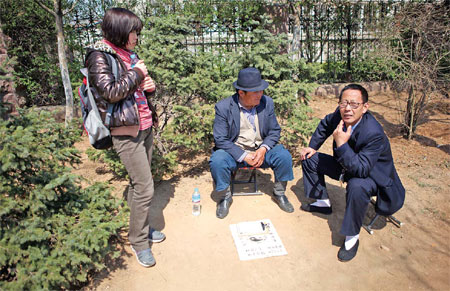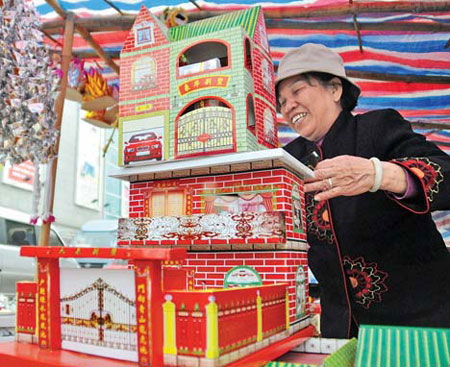A proactive approach to luck
Updated: 2012-01-03 07:41
By Li Yao (China Daily)
|
|||||||||||
|
|
|
|
Superstitions live on in China because, as many doubters say, better safe than sorry, Li Yao reports.
Imagine leaving a 12-year-old at home an entire day with doors and windows tightly closed, only to open them exactly at midnight with the child struggling to stay awake.
Mao Weiwei, now 26, spent just such a day in the summer of 1997, supposedly for her own good. She needed to avoid the evil spirits and bad luck that were predicted to befall her on that particular day in the Year of the Ox.
"I dressed in pajamas, watching TV and eating a lot that day. The superstitious precautions followed word-by-word the advice of a fortuneteller my aunt had visited."
Mao's parents were indifferent to fortunetelling but wanted to be on the safe side for their only child. That makes them fairly typical in China. But her aunt, now 57, has always gone to great lengths to pursue good luck and dodge ill fortune.
She invited Buddhist monks in Tibet to pray for Mao when she sat for college and graduate school entrance exams in 2004 and 2008.
"It cost about 2,000 yuan ($320) each time for the service. My aunt would like to think my success in both exams was thanks to her efforts to ask for Buddha's blessings on my behalf. I know it is due to my own hard work," Mao said.
She teaches at an English training center in Beijing.
Once Mao lost a Buddha pendant, a gift from the aunt, when she was at university in Shanghai. Mao was nervous and immediately called her mother. The aunt quickly learned the news and was pleased with Mao's reaction. A few days later, the aunt bought Mao a jade Buddha pendant.
Mysteriously, Mao found the old pendant under a pile of clothes when she received the new one. Now she leaves them in her eyeglasses case at home in Shenyang, Liaoning province, so they won't get lost again.
"I generally do not follow superstitions. But in this case I think Buddha saw my earnest regrets for not taking good care of the pendant and forgave my negligence," she said.
The fortunetellers
The aunt, Mao Chongjun, changed her name in 2000 at the age of 46 because she thought the earlier name, Mao Jun, had brought her rough years and difficulties.
She twice changed the name of her only child - from Chen Mao to Chen Yundi and finally, when he was 10, to Chen Guoquan - because he suffered poor health and frequent high fevers.
Chen studied cartoon animation at a university in Dalian, Liaoning province. When he graduated in 2010, he wanted to open a restaurant. The aunt consulted a fortuneteller and anxiously talked Chen out of the idea because it could lead to calamities. Chen dropped the idea and remains unemployed.
The aunt checks the match of Chinese horoscope signs when Chen introduces a girlfriend. She also has told Mao of a fortuneteller's version of Mao's future Mr. Right.
"He will be in the diplomatic field. His work has much to do with English. And I will get married before 30." Mao repeated the predictions, and rolled her eyes.
Mao's maternal grandmother died in 2011. She was attracted to Buddhism in her last years, suffering from illness, because she wanted to pray for a longer life.
The grandmother had lost a son in his prime. Fortunetellers had warned that he should not seek to have any girlfriend or it would mean very bad luck because he was the virgin boy disciple accompanying the Bodhisattva Avalokitesvara (Guanyin in Chinese). In other words, should remain single.
He later had an accident on a motorcycle ride with his girlfriend and underwent a blood transfusion. The blood he received was tainted, and he developed uremia.
Medical treatments were limited at that time, so the family relied heavily on superstitious practices, such as summoning his spirit, to remove his pain. By following these steps, his relatives felt they had done what they could to save his life, and came to terms with his leaving.
"After he passed away, my grandparents had a dream, seeing him resume his position beside Guanyin and smile at them," Mao said.
A whole fish
Many of the superstitions of China have been passed down from ancient times but are applied to modern life - even if only on a bet-hedging approach: They can't hurt and might help.
The practices often make people feel better about their lives as they expect a long life, better health, freedom from pain or disease, smooth relationships, prosperity and happiness. They abound during traditional holidays such as the Spring Festival and grand events such as a marriage ceremony.
For example, people celebrating their birthdays should eat long noodles, preferably one uncut piece, for longevity.
On dinner tables during the Spring Festival, a whole fish is a must. The Chinese word for "fish" is a homophone of the word for "surplus", so the dish symbolizes abundance in the new year. In coastal areas, however, the fish should never be flipped. That act symbolizes the capsizing of a boat.
For gifts, the combination of jujubes, peanuts, longans and lotus seeds is popular for newlyweds, because the phrase zao sheng gui zi, representing those foods, sounds like "having a son soon afterward".
In contrast, people should never send clocks or bells as gifts, as the word sounds like "burying the dead".
The Chinese also have deep fondness of auspicious colors and numbers. Red is the color believed to bring brightness, happiness and good luck. Eight is the luckiest number and is the most-wanted when people choose their telephone numbers or license plates.
In 2006, a shoe-making businessman in Wenzhou, Zhejiang province, fetched the car plate C8888 for his BMW with 1.66 million yuan ($262,300).
The number three is magical, too. In 2004, a man paid 1.82 million yuan ($284,000) for a lucky phone number - 133-3333-3333 - at a Beijing auction.
Yu Yuanyuan, 26, from Cangzhou, Hebei province, quit her job in a trainee program at Masterkong, a company with popular instant noodle brands, in Tianjin in December 2010, five months after landing the offer.
With a fresh master's degree from Shanghai International Studies University, Yu soon found another job in Tianjin but changed her mobile phone number. She said it contained too many 4s and had proved the inauspicious cause of her troubles with the first job.
No fuss
Mao Weiwei, who spent that day hidden from evil at age 12, does not heed such superstitions. When she needed to change her mobile number in Shanghai in 2004, she asked for ordinary numbers because it would have cost 50 yuan or more for a string of lucky numbers.
She got a number with three 4s, which many people would have dreaded, because four sounds like "death" in Chinese and is believed to bring bad luck.
"I don't think there should be so much fuss made about telephone numbers," she said. "And I had six wonderful years in Shanghai, despite that unlucky mobile phone number."
Today's Top News
Rescuers race against time for quake victims
Telecom workers restore links
Coal mine blast kills 18 in Jilin
Intl scholarship puts China on the map
More bird flu patients discharged
Gold loses sheen, but still a safe bet
US 'turns blind eye to human rights'
Telecom workers restore links
Hot Topics
Lunar probe , China growth forecasts, Emission rules get tougher, China seen through 'colored lens', International board,
Editor's Picks

|

|

|

|

|

|







